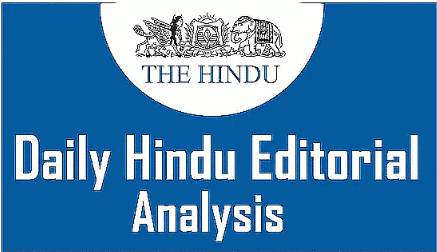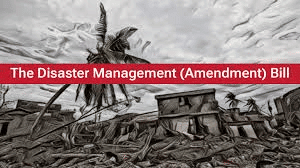UPSC Exam > UPSC Notes > Current Affairs & Hindu Analysis: Daily, Weekly & Monthly > The Hindu Editorial Analysis- 26th December 2024
The Hindu Editorial Analysis- 26th December 2024 | Current Affairs & Hindu Analysis: Daily, Weekly & Monthly - UPSC PDF Download

The Lapses in the Disaster Management Bill
Why in News?
- The Disaster Management (Amendment) Bill, 2024 aims to change the Disaster Management Act of 2005 but has sparked concerns due to its top-down approach, lack of inclusivity, and accountability issues.
- The Bill fails to include important provisions for relief measures and overlooks the crucial role of local communities in disaster management.
- Additionally, it misses opportunities for regional and international collaboration in disaster response.

Key Concerns Raised
Shift from Participatory Governance
- The Bill shifts from the inclusive governance model of the Disaster Management Act (DMA), 2005, opting for a top-down approach.
- It emphasizes terms like “monitor” and “guidelines,” moving away from building trust with local communities through “supervision” and “direction.”
Undermining Local Communities
- Global frameworks such as the Yokohama Strategy, Hyogo Framework, and Sendai Framework recognize local communities as “first responders” in disaster situations.
- The Bill overlooks the crucial roles played by local communities, panchayats, and NGOs, who have historically been at the forefront of disaster response, as seen in incidents like the Kerala floods and the Kedarnath disaster.
Gaps in Inclusivity and Evaluation
Intersectional Discrimination
- The Bill does not address the vulnerabilities of specific groups such as women, disabled individuals, marginalized castes, and LGBTQIA communities.
- By ignoring these intersectional challenges, the Bill falls short of its claim to inclusiveness.
Performance Evaluation
- There are no mechanisms in place to evaluate the disaster preparedness of district authorities.
- The lack of accountability measures opens the door for potential political exploitation.
Key Highlights of the Disaster Management (Amendment) Bill, 2024
- Preparation of Plans: Disaster management plans will now be prepared by the National Disaster Management Authority (NDMA) and State Disaster Management Authorities (SDMAs), instead of the National and State Executive Committees.
- Enhanced Functions: NDMA and SDMAs will have expanded roles, including periodic assessment of disaster risks, providing technical assistance, recommending relief standards, and maintaining disaster databases.
- Disaster Database: The Bill mandates the creation of comprehensive national and state-level disaster databases.
- Urban Disaster Management Authorities: State governments will have the option to establish Urban Disaster Management Authorities for state capitals and cities with municipal corporations.
- State Disaster Response Force (SDRF): States will be allowed to constitute SDRFs with defined functions and terms of service.
- Statutory Status: The National Crisis Management Committee (NCMC) and High-Level Committee (HLC) will be given statutory status.
- Appointments: NDMA will have the authority to specify staff and appoint experts with the approval of the central government.
Omission of Key Provisions
Accountability and Relief Measures
- Sections 12, 13, and 19 of the DMA, which mandated minimum standards for relief and special provisions for vulnerable groups, have been removed.
- Provisions for loan repayment relief and ex gratia assistance are missing without replacements.
Preparedness and Integration
- Sections ensuring integration and preparedness in disaster management plans have been omitted.
- State Executive Committees are no longer required to prepare for disasters effectively, as certain sections have been deleted.
Flaws in Good Governance and Speciesism
Neglect of Animals
- The Bill does not address the issue of disaster-related deaths of animals.
- It also overlooks the implementation of the Animal Birth Control (ABC) Rules, 2023, which are crucial for disaster preparedness.
Urban Disaster Management Authority (UDMA)
- The purpose of establishing UDMA lacks clarity in the Bill.
- Municipal Corporations, which are responsible for urban development, often contribute to flooding by encroaching on natural resources, raising concerns about the effectiveness of UDMA.
Missed Opportunities in Regional Collaboration
- The Bill does not incorporate mechanisms for international collaboration in disaster management, overlooking groupings like SAARC, BIMSTEC, and BRICS.
- The absence of references to the 2011 SAARC Agreement on Rapid Response to Natural Disasters highlights the Bill’s oversight of regional disaster strategies.
Conclusion
The Disaster Management (Amendment) Bill, 2024, weakens the foundational principles of participatory governance, inclusivity, accountability, and preparedness established by the DMA, 2005. Its omissions and top-down approach limit its effectiveness in addressing disaster management comprehensively.
The Lessons from a Spectrum of Areas
Why in News?
The 2004 tsunami taught us important lessons about how to manage disasters better. It showed us the importance of taking care of the environment, making sure help is fair, and being strong as a community.
- When the tsunami hit, it revealed problems caused by things like cutting down mangroves, privatizing land, and social inequalities.
- The disaster highlighted the need for policies that consider gender, involve communities, and use sustainable practices to reduce risks in the future.
Role of Mangroves and Natural Protection
- Mangroves are crucial for protecting coastal areas from waves. They act as natural barriers.
- However, large-scale destruction of mangroves for activities like shrimp farming, tourism, and wood extraction has disrupted these ecosystems.
- Artificial barriers, such as man-made structures, often make areas more vulnerable to waves instead of providing real protection.
Social Changes Due to Privatisation
- In Thailand, the privatisation of coastlines after the tsunami displaced local communities. This led to people finding work in the informal sector, making them economically vulnerable.
- The development of hotels and leisure activities on these coastlines changed traditional ways of making a living, contributing to the growth of the sex industry in these areas.
- These experiences in Thailand serve as a warning for India about the potential risks and negative impacts of privatisation and social disruption.
Economic Inequalities and Resource Exploitation
- After the tsunami, market disruptions benefited asset owners while harming traditional livelihoods.
- Mechanised fishing replaced artisanal practices, leading to over-fishing, waste accumulation, and resource degradation.
- Local economies suffered as externally sourced goods replaced local products.
- These economic challenges, worsened by privatisation and liberalisation, need targeted interventions but are still not well-studied.
Inequitable Relief and Rehabilitation
- Relief efforts often reflected pre-existing inequalities and excluded vulnerable groups such as Dalits, tribes, immigrants, and single women.
- Undocumented migrants faced difficulties in receiving aid and medical assistance due to legal restrictions.
- Asset-based damage assessments favoured wealthier segments, while fishing labourers and other vulnerable groups received minimal support.
- The unequal distribution of aid highlighted systemic inequities in how disasters are responded to.
Gender-Insensitive Policies
- Women’s roles in fishing communities, such as processing and marketing fish, were often ignored during rehabilitation efforts.
- Relief packages frequently excluded women because of male-dominated fish worker panchayat lists and the lack of property ownership by women.
- Widows faced extra challenges in receiving aid due to missing identification documents.
- Addressing social divisions is crucial for ensuring equitable relief and rehabilitation measures.
Importance of Local Structures
- Relief agencies often undermined community-based institutions by imposing external democratic practices that did not fit local contexts.
- Coastal communities like kuppams operate through active debate and consensus rather than formal elections, which fosters resilience and inclusivity.
- Long-term engagement with local structures is essential for effectively addressing gender and social concerns in disaster management.
Conclusion
- The lessons learned from the 2004 tsunami emphasize the need for inclusive and locally-driven approaches to disaster management.
- It is crucial to address systemic inequalities and respect community structures to ensure effective and equitable responses to future disasters.
The document The Hindu Editorial Analysis- 26th December 2024 | Current Affairs & Hindu Analysis: Daily, Weekly & Monthly - UPSC is a part of the UPSC Course Current Affairs & Hindu Analysis: Daily, Weekly & Monthly.
All you need of UPSC at this link: UPSC
|
38 videos|5293 docs|1118 tests
|
FAQs on The Hindu Editorial Analysis- 26th December 2024 - Current Affairs & Hindu Analysis: Daily, Weekly & Monthly - UPSC
| 1. What are the key shortcomings identified in the Disaster Management Bill? |  |
Ans. The key shortcomings in the Disaster Management Bill include inadequate provisions for local-level responsiveness, insufficient integration of community-based disaster management practices, and a lack of clarity in the roles and responsibilities of various stakeholders during a disaster. Additionally, the bill may not effectively address emerging challenges such as climate change and urbanization that exacerbate disaster risks.
| 2. How does the Disaster Management Bill propose to improve disaster preparedness? |  |
Ans. The Disaster Management Bill proposes to enhance disaster preparedness by establishing a framework for risk assessment and management, promoting the development of early warning systems, and ensuring regular training and capacity-building programs for emergency responders. It also emphasizes the need for collaboration between government agencies, NGOs, and local communities to create a more resilient infrastructure.
| 3. What lessons can be learned from previous disaster management experiences in India? |  |
Ans. Previous disaster management experiences in India highlight the importance of timely response, effective communication, and community involvement in disaster preparedness and recovery efforts. Lessons also emphasize the need for a multi-disciplinary approach, integrating scientific research with traditional knowledge, and the significance of psychological support for affected populations during disaster recovery.
| 4. Why is community involvement crucial in disaster management according to the editorial? |  |
Ans. Community involvement is crucial in disaster management as it ensures that local knowledge, needs, and capacities are taken into account, leading to more effective and culturally appropriate responses. Engaging communities fosters resilience, enhances preparedness, and empowers individuals to take an active role in their own safety and recovery, ultimately improving the overall effectiveness of disaster management efforts.
| 5. What roles do local governments play in the context of the Disaster Management Bill? |  |
Ans. Local governments play a vital role in the context of the Disaster Management Bill by being the first responders to disasters. They are responsible for implementing local disaster management plans, coordinating with state and central agencies, and mobilizing community resources. The bill emphasizes the need for local governments to be adequately equipped and trained to handle emergencies effectively and to ensure that disaster management strategies are tailored to the specific needs of their communities.
Related Searches
















